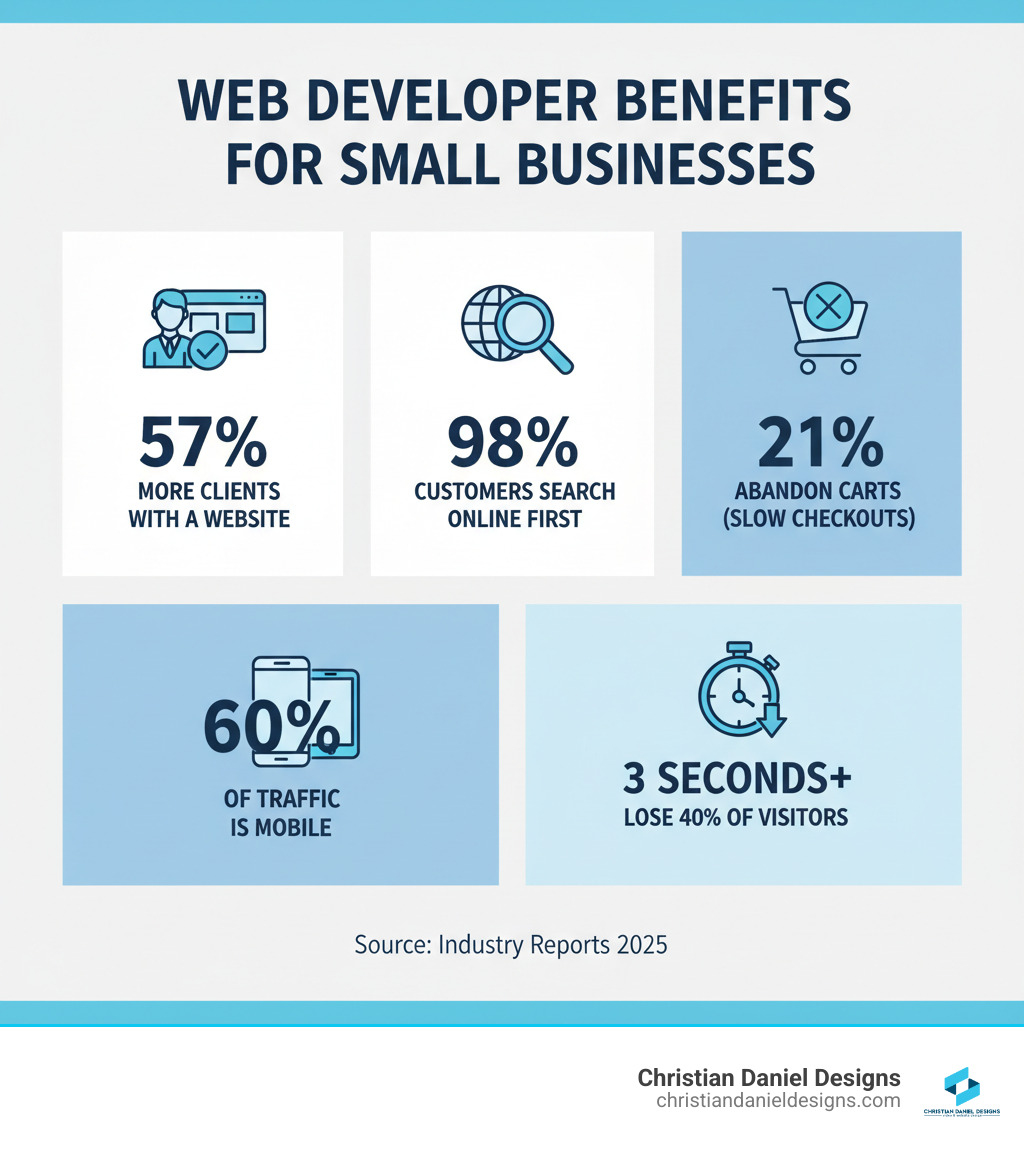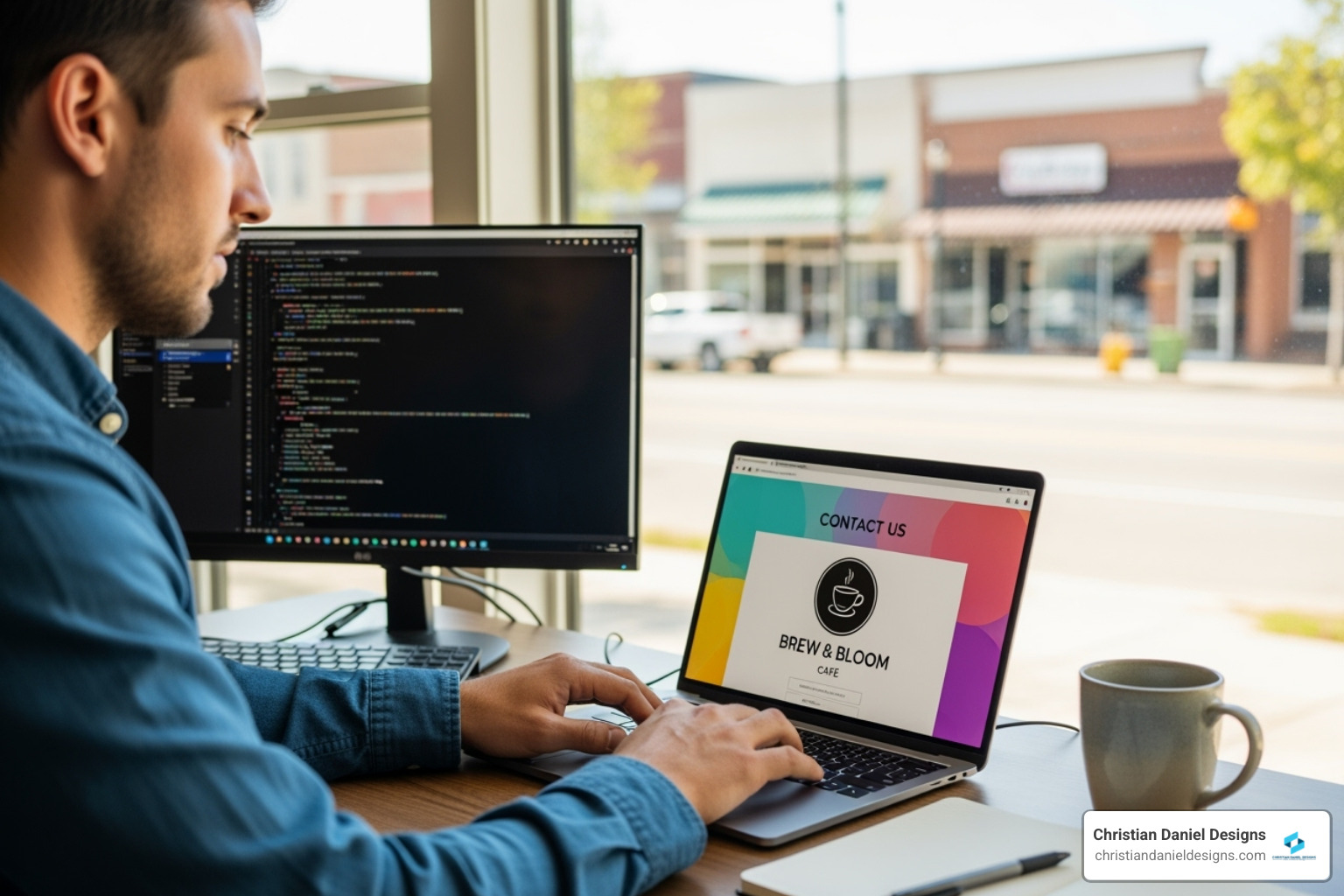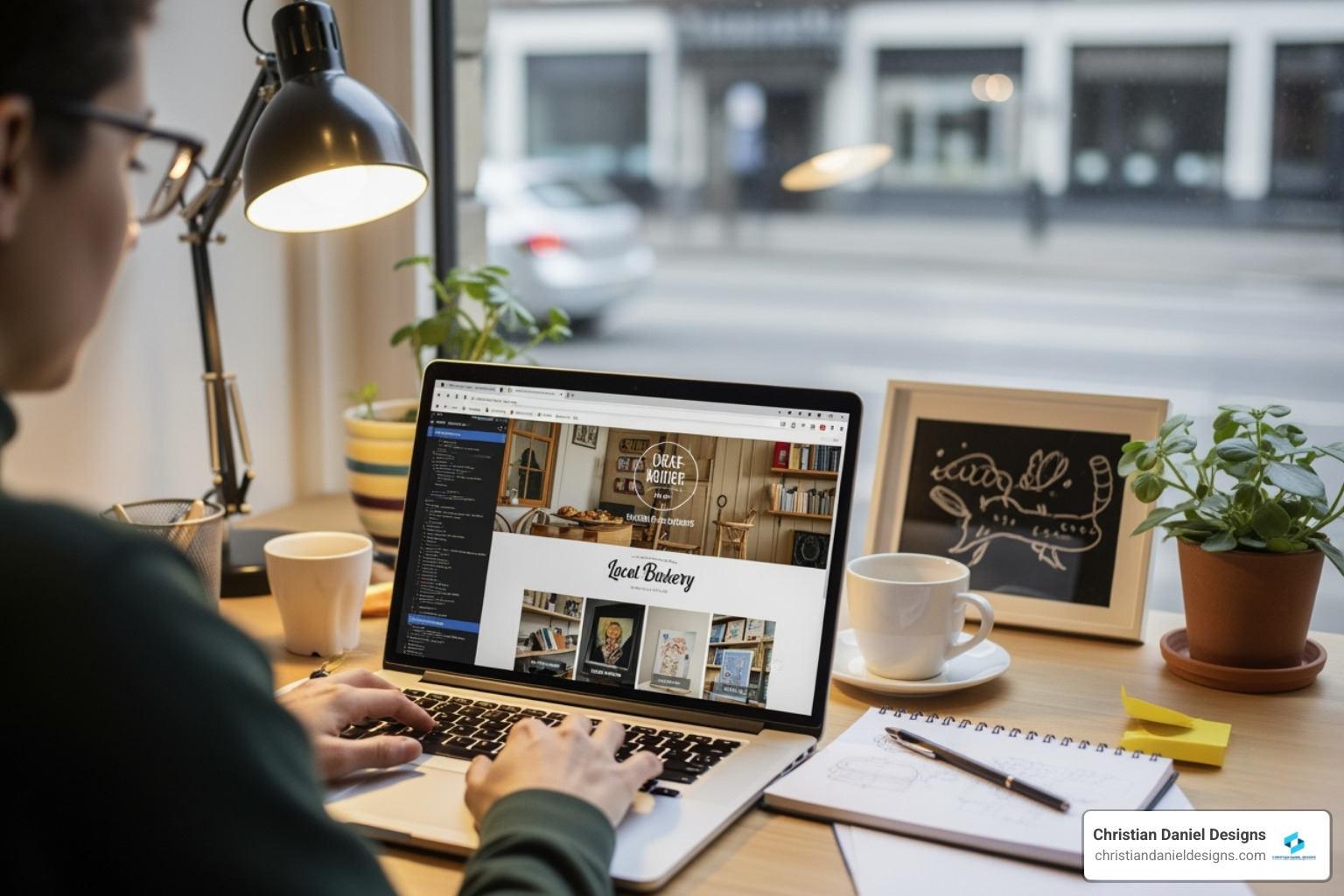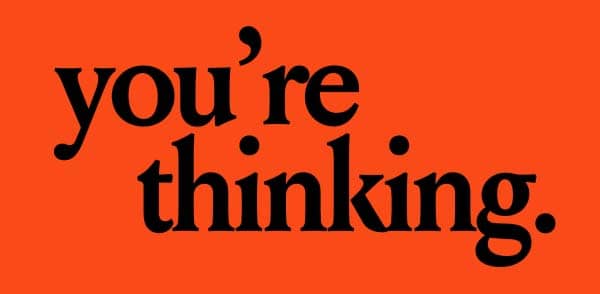Web developer for small business: Essential Guide 2025
Your Digital Storefront: Why a Professional Website is Non-Negotiable
A web developer for small business is a technical professional who builds, optimizes, and maintains your website to ensure it’s fast, mobile-friendly, secure, and designed to convert visitors into customers.
What a Web Developer Does for Your Small Business:
- Builds custom websites custom to your brand and business goals
- Optimizes performance so your site loads in under 3 seconds
- Ensures mobile responsiveness across all devices (60%+ of traffic is mobile)
- Implements SEO to improve search rankings and visibility
- Maintains security with SSL certificates, backups, and updates
- Integrates e-commerce functionality for online sales
- Provides ongoing support to keep your site running smoothly
Your website is your 24/7 salesperson. It works while you sleep, introducing potential customers to your business and building trust before they ever walk through your door or pick up the phone. In fact, 98% of customers start with an online search when looking for local services or products.
First impressions matter. A professionally designed website exudes credibility and can be the difference between a customer choosing you or your competitor. Research shows that small businesses with a website are 57% more likely to get a client than those without one.
But here’s the challenge: DIY website builders promise easy solutions, yet they often lead to slow-loading, generic-looking sites that don’t rank well in search engines. Templates can only take you so far. Without technical expertise, you risk losing customers to complicated navigation, poor mobile experience, or security vulnerabilities.
That’s where hiring a professional makes all the difference. A skilled web developer brings technical know-how, strategic thinking, and the ability to create a site that truly represents your brand while driving measurable results.
I’m Christian Daniel, and over the past 20+ years, I’ve worked as a web developer for small business owners across hospitality, dining, and creative industries, building custom websites that combine visual storytelling with conversion-focused design. My approach is consultative and hands-on—I take the time to understand your goals, your audience, and what makes your business unique, then translate that into a fast, accessible, and SEO-optimized website that works as hard as you do.

Web developer for small business vocab explained:
The Core Benefits: What I Bring to Your Business as a Web Developer

As a dedicated web developer for small business clients, my role extends far beyond simply putting up a few pages online. I bring a blend of technical expertise, strategic insight, and a long-term partnership approach, all designed to save you time and stress while significantly boosting your business. I focus on crafting custom solutions that are unique to your business, ensuring that every line of code and every design choice serves your specific goals.
A Custom Website to Make You Stand Out
When you’re trying to make an impression in a crowded market, a generic, template-based website just won’t cut it. While DIY builders might seem appealing for their low upfront cost, they often leave you with a site that looks like countless others, limiting your brand’s potential. As a web developer for small business clients, I specialize in building custom websites from the ground up, custom to your unique brand identity. This means your site won’t just look good; it will be a true reflection of your business, helping you stand out from competitors.
I dig into understanding your brand, your values, and your target audience to create a unique online presence. This process involves a keen focus on user experience (UX), ensuring that visitors find your site intuitive, enjoyable, and easy to steer. A custom-coded website provides superior performance and SEO advantages over sites built with page builders like WordPress, Wix, or GoDaddy, which often come with unnecessary code bloat. In my 20+ years of experience, I’ve found that custom development offers unparalleled flexibility and scalability, allowing your website to evolve and grow as your business does. This future-proofing is crucial for long-term success. For more insights on crafting unique online spaces, check out my Custom Website Small Business Guide.
Driving Leads and Sales
Your website isn’t just an online brochure; it’s a powerful tool for generating leads and boosting sales. My focus as a web developer for small business clients is on conversion-focused web design, meaning every element of your site is strategically placed to guide visitors towards taking action. This includes clear calls-to-action (CTAs), intuitive navigation, and optimized lead capture forms.
A seamless user experience is paramount, especially when it comes to e-commerce. Research shows that a staggering 21% of shoppers abandon their carts due to complicated checkout experiences. I carefully design and develop optimized checkout processes to reduce cart abandonment, ensuring that potential customers can complete their purchases without frustration. Websites optimized for user experience see significantly higher conversion rates, making the investment in quality design truly worthwhile. By integrating effective lead generation architecture and strategically placed contact forms, I help ensure your website is constantly working to expand your client base and increase your revenue. Learn more about how to turn visitors into customers with my guide on Conversion-Focused Web Design.
Technical SEO for Better Online Visibility
What good is a beautiful website if no one can find it? That’s where technical SEO comes in, and it’s a critical component of what I do as a web developer for small business clients. I implement on-page SEO best practices and optimize your site’s structure to ensure it’s easily findable by search engines like Google. This includes crafting clean code, optimizing page speed, and ensuring your site is ready for mobile-first indexing – a crucial ranking factor since Google primarily looks at a site’s mobile version.
Page speed optimization is particularly vital, as 40% of visitors abandon a site that takes more than 3 seconds to load. I strive for websites that load in under 1 second, providing an excellent user experience and boosting your search engine rankings. I also leverage schema markup to help search engines better understand your content, potentially leading to richer search results and improved visibility. By integrating these technical SEO elements from day one, I lay a strong foundation for your online presence, helping you attract more organic traffic and potential customers. Find more strategies for drawing visitors to your site in my guide on How to Attract Website Visitors.
Ensuring Security and Performance
In today’s digital landscape, website security is non-negotiable. As your web developer for small business, I prioritize the implementation of robust security measures to protect your site and your customers’ data. This includes installing SSL certificates, implementing firewalls, and setting up regular backups to safeguard against data loss. My security audits are designed to identify and mitigate vulnerabilities, protecting your business from hacks and cyber threats. After all, a compromised website can severely damage your reputation and lead to significant financial losses. For a deeper dive into protecting your online assets, refer to my Website Security Audits guide.
Beyond security, performance is key. I ensure your website is optimized for fast loading times, which not only improves user experience but also positively impacts your search engine rankings. I handle all aspects of hosting management, ensuring your site resides on reliable and secure servers. Regular maintenance and updates are part of my service, keeping your software current, patching security vulnerabilities, and ensuring your site continues to perform optimally. This proactive approach ensures your website remains a reliable and high-performing asset for your business.
Designer vs. Developer: Understanding the Roles and What You Need

It’s a common point of confusion for many small business owners: what’s the real difference between a web designer and a web developer? People often use these terms interchangeably, but they actually represent two distinct, yet wonderfully complementary, skill sets. I like to think of it like building a house. The designer is the architect, sketching out the vision and making sure everything looks beautiful and feels right. Then, I, as the developer, come in as the builder, constructing the strong foundation and ensuring every single part functions perfectly. It’s truly a blend of art and science, and for your website to be truly effective, collaboration between these roles is absolutely key.
What a Web Designer Does
A web designer focuses primarily on your website’s aesthetics and user experience (UX). Their main job is to make your site visually appealing, super easy to use, and perfectly consistent with your brand. They’re the ones who decide on the overall layout, choose your color palettes, select the right typography, and pick compelling imagery that truly resonates with your target audience. They are masters of User Interface (UI), crafting all those interactive elements you see and click on.
A designer typically starts by creating wireframes and mockups, which are essentially the blueprints of your website. This helps plan the structure and flow before any code is even written. They ensure your brand’s look and feel are consistent across all elements and often have strong graphic design skills to create custom logos, icons, and other visual assets. For small businesses, a good web designer ensures your site looks professional and inviting, making that crucial first impression count. If you want to dive deeper into making your site shine, my Designing Small Business Website Guide offers valuable insights.
What I Do as a Web Developer for Small Businesses
As a web developer for small business clients, my role is to take those beautiful designs created by a web designer (or the visual concepts I develop with you) and bring them vibrantly to life through code. My expertise lies in the technical implementation and functionality of your website. I handle both the front-end and back-end development to ensure a complete, working solution.
For the front-end, I write the code that users directly interact with in their browser. This includes HTML for the structure, CSS for all the styling (colors, fonts, spacing), and JavaScript for adding interactivity and dynamic elements. This ensures your site is responsive and looks fantastic on any device, whether it’s a desktop, tablet, or phone. The back-end development deals with the server, databases, and applications that power your site behind the scenes, ensuring smooth functionality, secure data storage, and overall reliability. I also integrate crucial features like e-commerce platforms, set up content management systems (like WordPress) for easy updates, and ensure all interactive elements, forms, and databases work seamlessly. My ultimate goal is to make sure your website isn’t just pretty, but robust, functional, and performs exactly as intended, acting as the engine and infrastructure that makes your digital storefront run efficiently. You can learn more about building effective online platforms in my guide, Web Design for Business Owners.
Comparing Web Designer and Web Developer
| Feature | Web Designer | Web Developer |
|---|---|---|
| Role | Architect / Artist | Builder / Engineer |
| Key Skills | UX/UI, Graphic Design, Color Theory, Typography, Branding, Wireframing, Prototyping | HTML, CSS, JavaScript, Back-end Languages (e.g., PHP, Python), Database Management, Server Configuration, API Integration |
| Main Focus | Visual Aesthetics, User Experience, Brand Consistency, Usability | Functionality, Performance, Security, Interactivity, Technical Implementation, Data Management |
| Tools Used | Figma, Sketch, Adobe XD, Photoshop, Illustrator | Code Editors (VS Code), Browsers, Git, CMS (WordPress), Frameworks, Databases |
| When You Need One | To create a visually appealing, user-friendly, and branded interface; to define the look and feel. | To bring the design to life, build interactive features, ensure technical performance, security, and back-end functionality. |
How to Choose the Right Web Developer for Your Small Business
Choosing a web developer for small business isn’t just about hiring someone to build a website. It’s about finding a true partner. Someone who truly understands your vision and can turn it into a powerful online asset. It’s a bit like a detective job, asking the right questions to make sure you’re making the best choice. My aim is always to build a long-term relationship with you, not just complete a one-time project.
Evaluating Portfolios and Testimonials
When you’re looking for a web developer for small business, the first thing I recommend is to really dig into their past work. Does their portfolio show experience in your industry, or with projects similar to what you need? Look closely at the quality of the sites, how well they perform, and the attention to detail. A great portfolio will feature sites that are not just pretty, but also fast, mobile-friendly, and fully functional.
Beyond the visuals, what other small business owners say about their experience is incredibly valuable. A survey by BrightLocal found that 76% of people regularly read online reviews for local businesses. This certainly applies to finding a good web developer too! Do clients highlight good communication, timely work, and actual results? Don’t be shy about asking for case studies. These stories can show you how a website helped a business achieve real goals, like more leads or sales. For example, I’m proud of my strong track record working with hospitality brands and other service businesses, and my clients’ feedback reflects that.
Understanding the Process and Communication
A clear and open process is a sign of a professional web developer for small business. When I first connect with you for my ‘findy’ call, I take the time to really listen. I want to understand your needs, your business goals, and any struggles you’re having with your current online presence. From there, I put together a detailed project proposal that clearly outlines the work, the timeline, and what you can expect.
My typical process unfolds in several key stages:
- Planning & Strategy: I work with you to define your goals, your audience, and the features your site needs.
- Design: I’ll create mockups and visual designs, making sure they match your brand.
- Development: This is where I bring the design to life with code, building both the front-end (what users see) and back-end (what makes it work).
- Testing & QA: I thoroughly check for any bugs, ensure everything works perfectly, and that it looks great on all devices.
- Launch: I launch your new website for the world to see!
- Post-Launch Support: I’ll be there for ongoing maintenance, updates, and to make sure your site keeps running smoothly.
Throughout this entire journey, I prioritize direct client collaboration. You’ll be involved with feedback and revisions at every step, ensuring the final website is exactly what you envisioned. Clear communication is the key to a successful project, and I make sure to keep you informed every step of the way.
Typical Costs of Hiring a Web Developer for a Small Business
The cost of hiring a web developer for small business can vary a lot, anywhere from around $2,000 to over $50,000. This wide range depends on things like how complex your project is, the specific features you need, whether it’s a custom build or using a template, and even the developer’s experience and location. (Rates in NYC, for example, might be a bit different from other places).
You’ll usually find two main ways developers charge:
- Project-based pricing: This is a set fee for the whole project. It works well when the project’s scope is very clear. Simple websites might start around $5,000, while more complex e-commerce sites can easily be $10,000-$25,000 or more.
- Monthly retainers: This is a regular fee for ongoing services. It often includes development, maintenance, updates, and support. Some services offer options with $0 down and monthly fees starting from $100-$150 for a standard 5-page website.
To make sure you’re getting good value, it’s really important to know your needs and budget from the start. While hourly rates for web development often fall between $30 and $80, think of the total cost as an investment that will pay off. Many small businesses see their website investment pay for itself within 6-12 months through more leads and sales. My goal is always to be transparent about pricing and to deliver a website that gives you a strong return on your investment. I believe professional web development can truly be an Inexpensive Websites for Small Businesses option in the long run.
Is It Time for an Upgrade? 5 Signs You Need a Developer
Even if you already have a website that’s been serving you for a while, there are often clear signals that it might be time for a fresh perspective. Sometimes, a professional web developer for small business like me needs to step in for an upgrade or even a complete redesign. Ignoring these signs isn’t just about looking a little behind the times; it can mean you’re missing out on real opportunities and even negatively impacting your bottom line.
I’ll walk you through those tell-tale signs.
First up, does your website look outdated? Most websites, like fashion trends, tend to show their age after about 3-5 years. If your site feels like it’s stuck in the early 2000s, it’s not just a minor aesthetic issue. It immediately sends a signal to potential customers that your business might also be behind the times. A modern, fresh design isn’t just about looking good; it truly exudes credibility and professionalism, making that crucial first impression count.
Next, and this is a big one, is it not mobile-friendly? Think about it: over 60% of all web traffic now comes from phones and tablets. If your website doesn’t adapt seamlessly to every screen size, from a tiny phone to a large desktop monitor, it’s a huge liability. People get frustrated quickly if they have to pinch and zoom just to read your content. Plus, Google primarily uses mobile-first indexing, which means non-mobile-friendly sites will naturally rank lower in search results. If your visitors are struggling on their phones, it’s definitely time for a responsive website design that works everywhere. You can learn more about this crucial aspect of modern web design in my guide on Responsive Website Design.
Then there’s the issue of speed: does it load slowly? In today’s world, patience is definitely not a virtue online. If your site takes more than 3 seconds to load, you could be losing up to 40% of your potential visitors. That’s a lot of missed connections! Slow loading times don’t just frustrate users; they also increase bounce rates and actively hurt your search engine rankings. A skilled web developer for small business can dive into the code and optimize your site for lightning-fast performance, ensuring visitors stick around.
Perhaps you’ve noticed you’re not getting leads or sales as much as you’d like. Your website should be a workhorse for your business, not just a pretty face that sits there. If your analytics show you’re getting traffic, but those visitors aren’t filling out forms, making calls, or completing purchases, there’s a fundamental issue. This could be anything from a confusing layout to unclear calls-to-action or a poor user experience. An effective website is strategically designed to convert visitors into paying customers. If yours isn’t doing that, it’s holding your business back.
Finally, consider this: can you update it yourself (or is it a nightmare to do so)? If adding new content, updating images, or even changing a small piece of text feels like a monumental task, or if you constantly have to rely on someone else for minor changes, your website isn’t working efficiently for you. A good web developer for small business understands that you need control. I make sure to integrate a user-friendly Content Management System (CMS) that allows you to easily update text, images, and blog posts without ever needing to touch a single line of code. It puts the power back in your hands.
If any of these five signs sound familiar, it’s a very clear indicator that your current website might actually be hindering, rather than helping, your business growth.
I’m Ready to Build Your Business’s Future, Together
Here’s what I know after 20+ years in this business: a professional website isn’t just another expense on your balance sheet. It’s an investment in growth—one that pays dividends every single day. Your website works while you sleep, introducing your business to potential customers, building trust, and generating leads around the clock. It’s your 24/7 salesperson, your brand ambassador, and often the very first handshake with the people who’ll become your most loyal customers.
But a website is only as good as the partnership behind it. That’s why choosing the right developer is a crucial partner decision, not just a transaction. You need someone who’ll take the time to understand your business, your goals, and what makes you different. Someone who’ll translate your vision into a digital presence that doesn’t just look good, but actually delivers measurable results.
I’m Christian Daniel, and for over two decades, I’ve specialized in building custom, fast, and mobile-friendly websites that drive real outcomes for small businesses and hospitality brands. My approach is hands-on and collaborative—I work directly with you, not through layers of project managers or automated systems. I’ve learned that the best websites come from genuine conversations, from understanding the heart of what you do and why it matters.
What sets my work apart is the combination of technical expertise and storytelling. I don’t just code; I create digital experiences that reflect your brand’s personality and connect with your audience. Every site I build is optimized for speed (I’m talking under 1 second load times), designed to convert visitors into customers, and built with clean code that search engines love.
Whether you’re in New York City, Queens, Jersey City, Hoboken, or beyond, I’m here to help you build a website that works as hard as you do. I would love to create something exceptional with you—a digital storefront that makes you proud and drives tangible growth for your business.
Ready to start the conversation? Get in touch to discuss your project.













